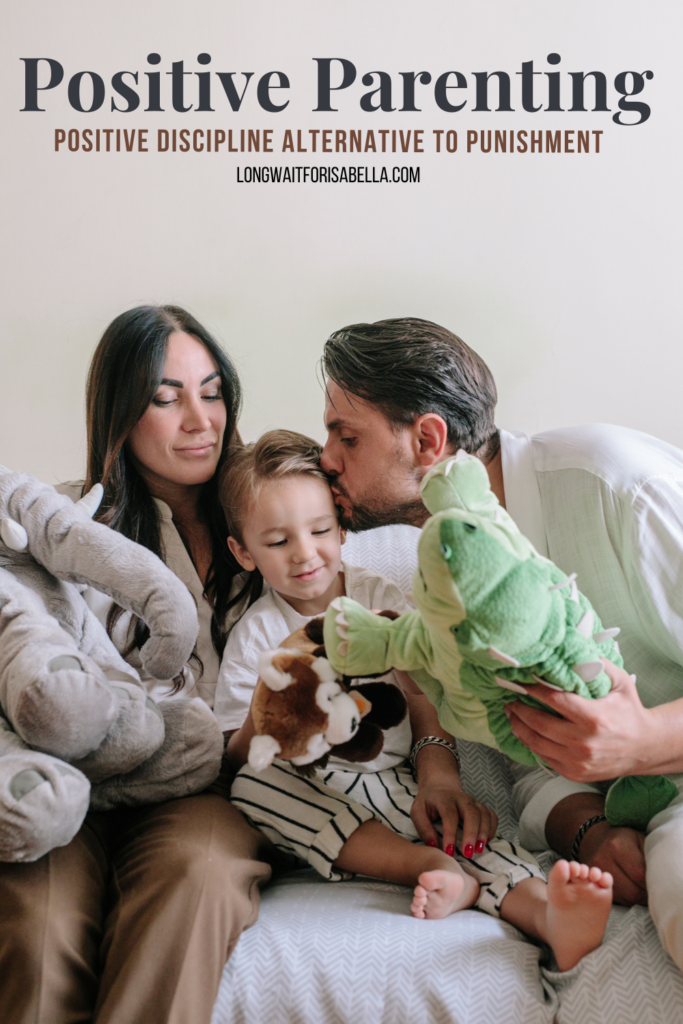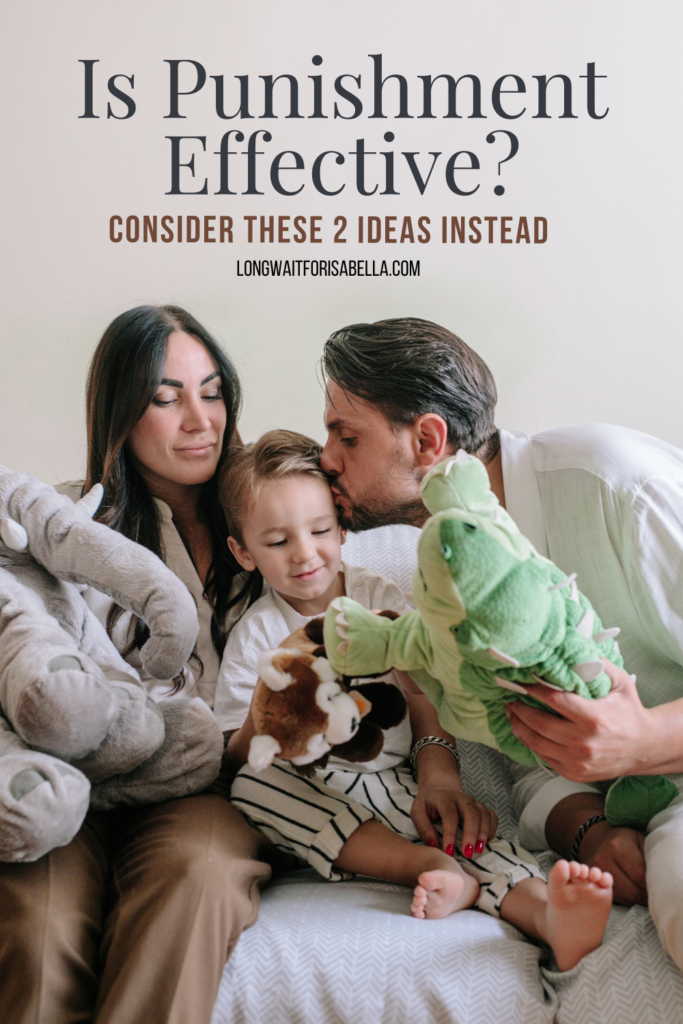A guest post from Sarah R. Moore.

Many parents have asked whether punishment “works” to stop unwanted behavior, especially with younger children. Some have heard the false narrative that they need to “nip negative behavior in the bud” before it becomes a problem.
What this fails to consider, however, is two things:
- The impact on the parent-child relationship, and
- The fact that punishment does not give the child tools they need to learn appropriate behavior.
Does punishment stop undesired behavior?
Yes, punishment teaches (in a way), and I’ll expand on that in a moment. Here’s the thing, though, as described in Peaceful Discipline: Story Teaching, Brain Science, and Better Behavior:
“…if we want a connection-based relationship with our kids, we can’t expect them to feel connected and meet their struggles with the parental equivalent of a ticket for exceeding the speed limit every time they misstep. Our children generally aren’t engaging in behaviors that have the potential ramifications that a car accident could. They’re kids. They’re doing the best they can with the skills they can access in the moment.”
Punishment is not the kind of discipline we want to use to teach children, especially since over time, children learn to not only avoid punishment by hiding their behavioral choices from us, but they also learn to avoid connection with us for fear of being found out.
That’s a high price to pay for punishing children.
In short, it backfires.
Common punishments and their drawbacks
Is a time-out effective for problem-solving?
Although the concept of a time-out is a popular go-to, it’s also problematic. People tend to default to what they learned when they were kids and “standing in the corner” was a quick way our parents learned to put an end to any power struggle we may have had with them.
As with other punishments, all it really taught us, however, is that our parents had control over us. Teaching this way isn’t teaching; it’s simply control. No child goes to their time-out corner and thinks, “Gosh, I’m sure learning a lot here.”
That said, a calming space that the child truly perceives as peaceful, as part of co-regulating with the parent, can be beneficial. We can learn to hold space for their big feelings.
What about physical punishment?
Spanking, also known as corporal punishment, is a common form of physical punishment. It’s associated with a host of significant problems, both short-term and long-term, for the child’s development. Although some parents erroneously claim it’s a good teacher and is helpful for changing behavior, those changes are, once again, fear-based.
According to vast amounts of research, we now know that spanking a young child breaks trust and may hinder development in the same ways that even stronger forms of abuse do. Further, spanking may even contribute to long-term behavioral and mental health problems.
Finally, people who are using Christianity to justify physical punishment may be surprised to learn that “Spare the rod, spoil the child” doesn’t come from the Bible.
Truly, no one “turns out fine” with spanking. They may recover from it, but it is not an effective form of parental discipline.
Children who were punished through this authoritarian “my way or the highway” approach didn’t necessarily learn from these consequences, but they certainly suffered from them.
What’s the positive discipline alternative to punishment?

What if we start with compassion instead?
What if we remember that to discipline means to teach? What if we remember that our child is a person with valid feelings who genuinely wants to please us, and they’re doing the best they can with the tools they have at the moment?
Could we focus on understanding what’s at the root of our child’s behavior rather than addressing only what’s happening at the surface?
Indeed, punishing children doesn’t teach them what to do–it only makes them feel bad about the things they’ve done. Punishment offers no roadmap.
Instead, in conscious parenting, we use natural consequences and logical consequences, knowing that almost invariably, natural consequences (although commonly misunderstood) are going to be life’s best teachers.
The antidote to punishment is curiosity and connection. We learn about our own triggers and how to support ourselves, while also remembering that every child learns best when they feel emotionally safe.
Where to start if you want to break the cycle of punishment
Most parents who choose to break the cycle of punishment want to know how to treat their children differently. That’s important, but the first place to start is with self-compassion. We did the best we could with what we knew at the time, and we deserve grace just like our children do.
We can create parenting goals that are specific and actionable, starting as small as we need to.
When we catch ourselves being peaceful at a time when we’d traditionally been punitive, we can give ourselves positive reinforcement and celebrate our wins. Positive reinforcement strengthens our neural connections in the brain and helps solidify our new, healthier patterns.
The natural consequences of our own “good behavior” in parenting are a closer, more joyful relationship with our children. It’s very much worth the investment.
Pin it for later:

*
Sarah R. Moore is the best-selling author of Peaceful Discipline: Story Teaching, Brain Science & Better Behavior and founder of Dandelion Seeds Positive Parenting. As a Master Trainer in conscious parenting, she’s also a public speaker, armchair neuroscientist, and most importantly, a Mama. Follow her on Instagram, Facebook, YouTube, TikTok & Twitter.


